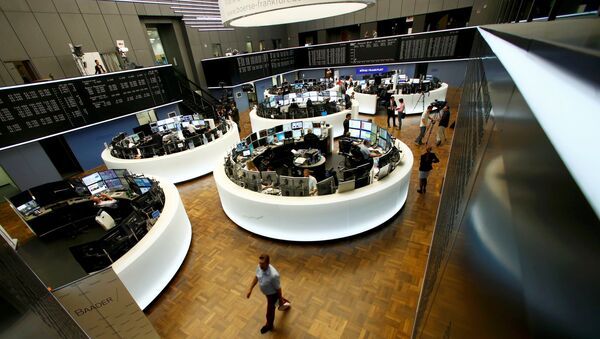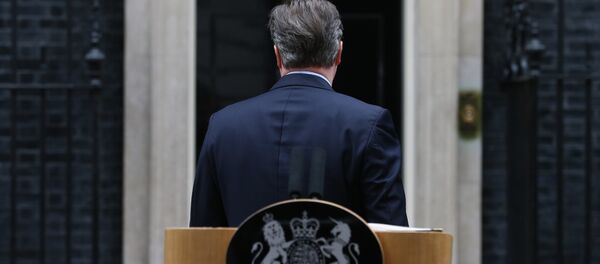Amidst the increasing fragmentation of international trade, with major economies struggling for risk reduction by attempting to decrease their exposure to international headwinds, the British radical solution turned out to be an immediate shock to markets at home and overseas, wiping out dozens of billions of capital from financial markets here and there.
Yet, such a "shock therapy" to international economy has produced massive, yet short-lived downside effects, with recovery and rebalancing entailing. Among most prominent near-to-mid-term effects of the Brexit are a likely abstinence of the US Federal Reserve from raising rates, a rebound in manufacturing the UK and the US as declines in currency FX rates in both economies are inevitable, an increased volatility in commodity trading, and the Bank of England's (BOE) policy response in the form of higher base borrowing costs.
Mainland Europe's banking sector was massacred by Brexit, with EU Stoxx 600 Index having posted a crash "worse than Lehman," with Credit Suisse and Deutsche Bank among the most prominent Brexit losers. The index crashed an average 13 percent, with these two aforementioned banks losing 15 percent of their market value each. In Europe, a feverish selloff in euros prompted a significant demand for the US dollars, which, amidst the current policy turmoil and slower growth in the US hardly makes sense per se, yet indicates a financial panic in the EU.
"We see the uncertainty created by the outcome today weighing on capital markets activities," with European banks losing huge amounts of money, Kian Abouhossein of JPMorgan Chase & Co. said.
The BOE has repeatedly noted earlier this year that hikes in base borrowing costs are likely should the UK vote to leave the EU, not least in order to support the sterling's FX rate. That said, a tighter monetary environment would attract capital, making up for the initial LSE losses, which, coupled with the lower value of British assets in the Brexit aftermath, provides many lucrative investment opportunities. This is a medium-term scenario, however, with such developments unraveling over the course of the next two years. The initial shock is likely to depress the British economy for several months right now.
The pound plunged to $1.34 after the Brexit announcement, rebounding to $1.36 later on, performing better than previous predictions. Deutsche Bank was previously expecting the pound to plunge to as low as $1.29 in the event of Brexit. This is an indication of the UK economy's resilience to even such a major shock, and also suggests investors and currency traders are eyeing an expansion in British exports, pushing manufacturing up as well by late 2016.
"In a funny way, we have some sort of certainty now even though there are clearly further questions to be answered," Roger Barron of London-based legal services firm Linklaters LLP said. "We are aware of a few processes that are getting ready to launch in July, and while some of them may pause just to assess immediate market reaction, I think they are still likely to go forward."
The initial sock of Brexit sent the sterling's FX rate, along with most stocks and commodities, down, with a rebound following surprisingly quickly. The pound had dropped 11 percent, rebounding 4 percent afterward. In the US, the Dow Jones Index had crashed 500 points, yet holding up above previous expectations.
The Japanese yen rose further to 102.43 per USD, proving its safe-haven status and annihilating last hopes that monetary policy is still an efficient macroeconomic tool. The US Treasuries and gold demonstrated similar safe-haven dynamics, whilst commodities dropped, with oil retreating to $46-48/bbl.
"The markets are holding up a lot better than I would've thought between Europe and North America," Frank Maeba of Toronto-based Breton Hill Capital said. "The central banks are saying all the right things and they're flooding the market with liquidity so you have a more orderly move. You may be seeing some tactical rotation, the US looks more solid now."
Chances of a recession in the UK are still low, whilst the Brexit impact to the remainder of the EU is devastating. Recently, with the UK's growth looking more solid than that of the Eurozone, the British economy has proven more shock-resilient and competitive in a way, only losing to German exports due to FS rate discrepancy between the sterling and the euro. This situation will be changing gradually, but a structural rebalancing will be gradual and slow.
"There is no need to change the economic forecast at this point, there is no need to change investment strategies at this point," Tim Hopper, TIAA Global Asset Management, said.
Interestingly, the success of Brexit had an impact on US politics, improving the chances for Donald Trump to be elected into office. The main reason the actual Brexit turned out to be not quite as ugly as portrayed previously, triggering public opinions more supportive of the right-wing cause here and there.





